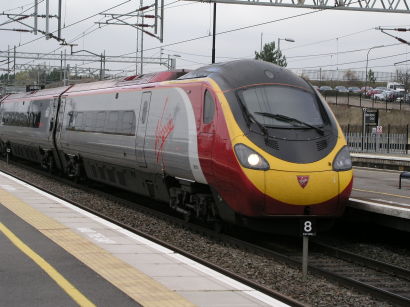THE TROUBLED Department for Transport is facing a week of crucial decisions. A major report into how the West Coast franchise competition collapsed is due to be published, amid rumours that a separate inquiry will conclude that the notion of long franchises should be abandoned.
The DfT has been locked in talks with Virgin Trains for well over a month over the terms of an emergency West Coast contract, but so far without any conclusion.
The present Virgin franchise expires at 02.00 on 9 December, which is now less than two weeks away, and the DfT must make sure that the trains keep running.
Transport secretary Patrick McLoughlin announced the start of negotiations with Virgin on 15 October, but insiders say both sides have been taking a 'hard line' over the terms of the deal. Mr McLoughlin also said that the new contract would last for between nine and 13 months and then be followed by two franchises.
The first would run for about two years, and the second would be a long-term contract which would last until about 2026.
The Government has been paving the way for longer franchises in general, arguing that the franchisees then have more incentive to invest. The example often quoted is that of Chiltern Railways, which has a 20-year term and has been sponsoring several major infrastructure upgrades on its routes.
But the second of two reports following the West Coast problems is said to be poised to recommend that shorter franchises would be safer and easier to run. The inquiry, which is in the charge of Eurostar chairman Richard Brown, is currently seeking views from around the industry.
Mr Brown is due to present his report at the end of December, although he is said to be keen to complete his work by Christmas.
Ministers should be seeing the final version of an earlier inquiry this week, however. Centrica chief executive Sam Laidlaw has been inquiring into the specific failure to complete the West Coast competition in August, when Virgin halted the award of a 13-year contract to FirstGroup by starting proceedings in the High Court.
The DfT admitted that Virgin was right to query some of the terms of the deal with FirstGroup in a dramatic ciimbdown just after midnight on 3 October and withdrew the award to First, whose contract had not been finally signed off.
In a related development, the DfT's head of major projects Peter Strachan has written at length to all four West Coast bidders, giving details of a meeting in June of the Department's contract awards committee, or CAC, which discussed the terms of the financial buffers which bidders should provide.
These buffers take the form of 'subordinated loans'. and are intended to protect the Department from the financial consequences of a failure to maintain the franchise.
First was eventually required to provide £190 million, plus a further £10 million of shareholders' capital, while Virgin was asked for £40 million. The smaller figure was said to represent the lower risk posed by the Virgin bid, but Virgin then claimed that the more ambitious revenue predictions made by First should have been protected by a loan of £600 million.
It has since emerged that not all the bidders were given the same information, and that there were 'serious technical flaws' in the way the DfT operated its financial model.
Mr Strachan is now reported to have told bidders that “stark inconsistencies between the different accounts of officials in attendance at the June 27 2012 CAC meeting have meant it is not possible for the Department to give a clear view as to what happened”, including a now-disputed issue concerning a financial 'overlay' which one bidder – thought to be FirstGroup – is said to have applied to its revenue forecasts,
This and other matters should be dealt with by Sam Laidlaw when he presents his final report at the end of this month, but Ministers have a more urgent matter in their in-trays -- whether terms can yet be agreed with Virgin before the crucial deadline of 9 December.


